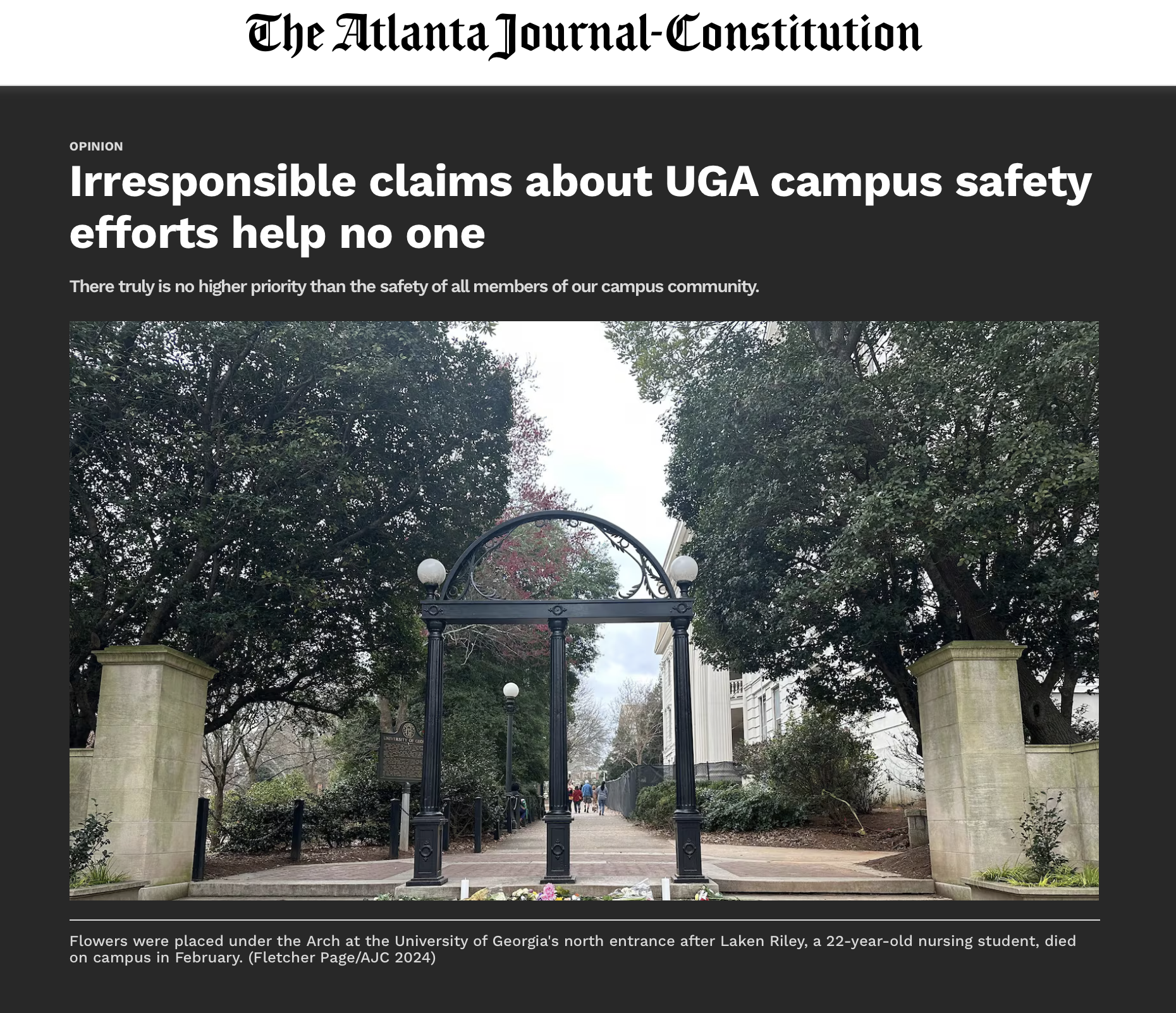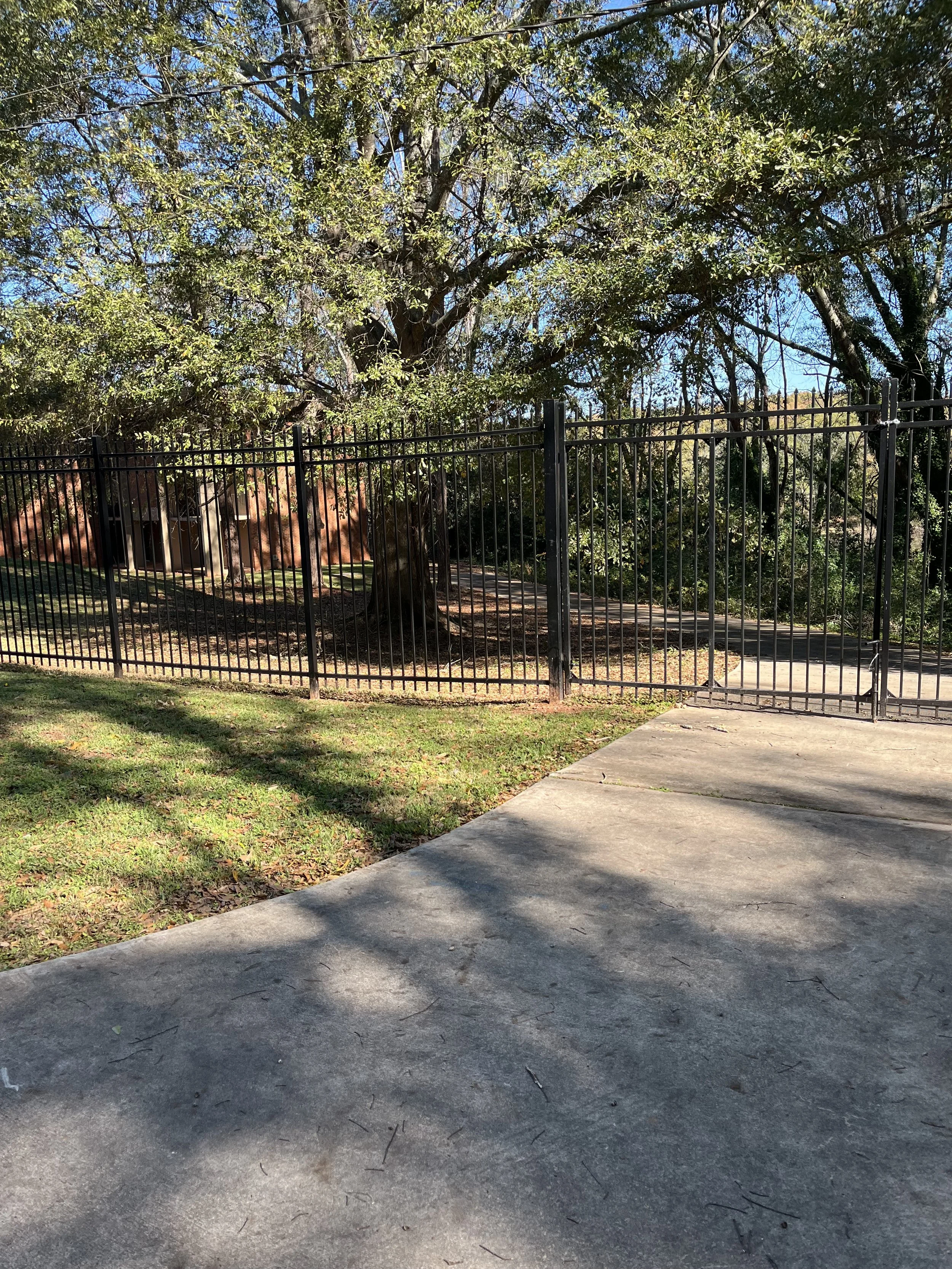AJC.com: SafeD Athens co-founder says safety measures were implemented too late on University of Georgia campus.
11/20/24 By Alexis Stevens, AJC
A nonprofit composed of University of Georgia parents said it tried for years to get security enhanced on the Athens campus. But those suggestions weren’t heard until nursing student Laken Riley was murdered in February while out running, Lynn Gainous, a co-founder of SafeD Athens, told The Atlanta Journal-Constitution on Wednesday. “This crime was 100% preventable,” Gainous said. “There were so many things out there that could have deterred it.” Riley’s death was the first homicide on the grounds of Georgia’s flagship public university in more than two decades.
When her own children were UGA students, Gainous said, she became involved in campus safety, first with the UGA Parents for Safety and Security group before launching the nonprofit.
Gainous said she met with school leaders as well as Athens government officials to suggest ideas such as a safe zone, layered security infrastructure, increased lighting, and a real-time crime center.
In July, UGA detailed the $7.3 million committed for safety enhancements, including a 20% increase to the UGA Police Department budget and a new unit of Campus Safety Ambassadors. But those improvements were too late for Riley, despite her group’s efforts, Gainous said. “What is it going to take?” Gainous asked. “How many students are going to lose their lives? How many families are going to be shattered because the University of Georgia will not bring cutting-edge security enhancements to the campus? What’s it going to take?”
For Gainous and her group’s supporters, Riley’s death is a reminder that more is needed to prevent further violent crimes. She said an independent safety assessment is needed from an outside group in order to move forward.
“We’re still hopeful,” she said. “UGA is going to have to do more to ensure student safety.”
Riley’s death made national headlines after the arrest of Ibarra, a Venezuelan national who authorities say entered the country illegally in 2022. He was arrested the day after Riley’s death. The nursing student’s story became the example for politicians wanting to close the U.S. border to immigrants.
On Wednesday, November 20, Jose Ibarra was found guilty of murder for killing 22 year-old Riley. He was sentenced to life in prison without the possibility of parole. Superior Judge H. Patrick Haggard delivered his verdict 15 minutes after closing arguments were completed.
After the verdict and sentencing, President-elect Donald Trump was among those who posted reaction on social media. “JUSTICE FOR LAKEN RILEY! The Illegal who killed our beloved Laken Riley was just found GUILTY on all counts for his horrific crimes,” Trump posted on Truth Social. “Although the pain and heartbreak will last forever, hopefully this can help bring some peace and closure to her wonderful family who fought for justice, and to ensure that other families don’t have to go through what they have. “We love you, Laken, and our hearts will always be with you. It is time to secure our border, and remove these criminals and thugs from our country, so nothing like this can happen again!” Trump posted.
Gov. Brian Kemp said open-border policies failed Riley. “Though we are glad that justice has been served for Riley, we continue to mourn her loss with her family and friends and know that she should still be with us today,” Kemp said.
11/21/24 By P. Daniel Silk, UGA Public Safety
Laken Riley’s brutal murder on the University of Georgia campus was a heinous,senseless crime—one that devastated our campus community. We continue to grieve her tragic death. But for an ill-informed group to claim the crime was “100% preventable” had the university heeded its advice is not only shamefully opportunistic, it is also patently false. And it is highly disappointing that The Atlanta Journal-Constitution would spread these inaccuracies without checking the facts or giving the university an opportunity to comment. The University of Georgia is a community of more than 50,000 people that also hosts alumni and other visitors to our campus for events throughout the year. We are akin to a midsized city, and we are a microcosm of society.
Unfortunately, no one can guarantee 100% safety. We are never perfectly safe, but we must always strive to be safer. As someone who is a 30-year veteran of local, university and federal law enforcement, I can assure you that UGA’s commitment to public safety is sincere and that its investment in cutting-edge security enhancements is extensive. There truly is no higher priority than the safety of all members of our campus community. That is why the University of Georgia has invested $23 million over the past eight yearson safety and security enhancements throughout our 760-acre campus, including $16 million in enhancements before Laken Riley’s murder. The comprehensive measures taken since 2016 include:
Hundreds of lighting upgrades and improvements
More than $4 million in additional camera security systems installed across campus properties
Enhanced overnight transportation options, including a rideshare program for students that operates every night of the week. Nearly 129,000 rides have been
provided to UGA students through this service since its inception in December 2021
The installation of 20 emergency call stations, each equipped with 360-degree cameras, 24/7 video recording, and Wi-Fi
A 21% increase in the number of UGA Police Department officers
11 new Campus Safety Ambassadors who are on duty from 7 p.m. to 3 a.m. each night of the week and can escort students as they walk through campus
Nearly 20,000 subscribers to the UGA Safe App, which features a mobile BlueLight and allows users to immediately contact police
Additional security fencing with gate access via keycard
20 automated license plate readers in strategic locations across campus
Permanent increases to UGA’s infrastructure budget to support annual maintenance and ongoing lighting and security camera upgrades
Partnerships and funding for Athens-Clarke County to make additional upgrades outside the bounds of the UGA campus
What we have not done is divert resources from proven safety measures to some of the misguided ideas promoted by SafeD Athens. But we will continue to work with local, state and federal law enforcement as well as other responsible, well-intentioned partners across the state of Georgia and beyond to continuously evaluate and improve our safety and security measures.
I cannot simply stand by and let misleading commentary about the university’s public safety efforts go unchallenged. I have never worked in any environment in which safety is more important, and the university’s dedication to the health and well-being of students is unwavering.There is not a police chief, parent or university administrator I have ever met who would not leap at the chance to genuinely guarantee 100% safety. As much as it pains me to say it, it’s not a promise we can make. We can, however, commit ourselves to doing all we reasonably can, in conjunction with our community partners, to strive to make our campus safer every day.
Dr. P. Daniel Silk is the associate vice president for public safety at the University of Georgia and former UGA chief of police. He has served as a captain with the Athens-Clarke County Police Department and served on the first permanent staff at the US Embassy in Kabul, Afghanistan after 9/11 as a special agent with the US State Department.
Image: Fencing installed after the Peeping Tom incident — would this have deterred Ibarra? Campus-wide CPTED assessment is needed NOW!
REBUTTAL: To UGA and Dr. Dan Silk (submitted to AJC.com on 11/23/24)
We deeply appreciate the University of Georgia’s acknowledgment of the devastating impact of Laken Riley’s tragic death and their ongoing efforts to improve campus safety. Laken’s loss has left an indelible mark on her family, friends, and our community. We share an unwavering commitment to honoring her memory by addressing preventable gaps that could save lives and prevent future tragedies. While we recognize the investments UGA has made in safety infrastructure and programs, more can—and must—be done. Our advocacy does not suggest that any institution can guarantee 100% safety. Instead, it highlights opportunities to reduce preventable risks through comprehensive safety assessments, collaborative solutions, and policy evaluations. We can approach 100% safety or “zero crime” asymptotically through effective layering of proven safety and security initiatives to mitigate risks and maximize security.
Included in our rebuttal are several initiatives listed below in which we have benchmarked across the country for over three years. Our research, data, and findings have been conducted responsibly, and we are well-informed. Moreover, these safety measures are proactive, designed to prevent crimes rather than merely respond to them after the fact.
Addressing Gaps in Policy and Technology
Laken’s murder underscores the critical importance of addressing procedural gaps and leveraging modern safety technologies. For instance, the Real-Time Crime Center (RTCC) model, successfully implemented at Georgia Tech and under development by the Athens-Clarke County Police Department (ACCPD), integrates camera footage for strategic officer deployment, real-time intelligence gathering, crime interruption, and rapid suspect identification.
While UGA has pledged to integrate its cameras with ACCPD’s RTCC, there has been no transparency regarding progress. Despite assurances in public forums that a Memorandum of Understanding (MoU) between UGA and ACCPD was forthcoming, our open records request for the MoU has gone unanswered. Parents and students deserve clarity on whether UGA’s participation in this initiative is advancing—and when it will be fully operational.
911 Dispatch Policies: A Matter of Life and Death
Perhaps the most alarming issue is how 911 calls are handled. Laken’s 911 call, made in the critical moments before her death, was not dispatched; the 911 Center’s policy is to not dispatch 911 hang ups from cell phones. Testimony revealed that cell phone 911 calls originating on UGA property are routed to ACCPD. This procedural gap had devastating consequences. It remains unconfirmed whether UGA police—investigating a Peeping Tom and attempted illegal entry roughly 400 yards away from Laken’s location—were aware of her distress call at that specific time.
This tragedy raises urgent questions:
Why was Laken’s 911 call not mentioned in the UGA police report?
Could geolocation data from the call have facilitated a faster response?
How might UGA police have acted differently had they been informed of her call during their nearby investigation?
These are not trivial concerns. They demand transparent answers and an immediate review of dispatch protocols to ensure no emergency call goes unanswered.
Comprehensive Independent Safety and Security Assessments: A Proven Path Forward
We have long advocated for an external, independent security assessment of UGA’s policies, infrastructure inlcuding CPTED (Crime Prevention Through Envionmental Design) and procedures. Universities that have undergone such audits have identified critical gaps and implemented life-saving measures as a result. Security professionals at peer institutions affirm the value of these assessments, noting that even the best teams benefit from fresh perspectives and external expertise.
While UGA’s recent safety improvements are commendable, they do not address every concern. Additional cameras and lighting are essential, but their full potential as crime deterrents and investigative tools cannot be realized without strategic integration into systems like an RTCC. Furthermore, as ACCPD advances cutting-edge technologies for emergency response, UGA’s active participation is crucial to ensure seamless coordination.
A Call for Collaboration, Not Confrontation
SafeD Athens and UGA Parents for Safety and Security have always sought collaboration with the university. Our proposals, informed by research and benchmarking best practices from other institutions, are designed to enhance safety in ways that align with UGA’s stated goals. Dismissing our concerns as unwarranted or reactive ignores the lived experiences of students and families who continue to face preventable dangers.
We urge UGA to embrace this opportunity for meaningful collaboration. By commissioning an independent security assessment and fully committing to proactive safety initiatives, UGA can demonstrate its dedication to protecting every member of its community. Furthermore, we call on UGA to be transparent about its progress and to keep the community informed when improvements are made. Open communication is essential in rebuilding trust and ensuring that students, parents, and staff feel confident that meaningful steps are being taken to prioritize their safety.
Conclusion
The heartbreak of Laken’s murder is a painful reminder of what is at stake. Her family and friends deserve a legacy that ensures no other family endures such an unimaginable loss. Students and parents remain deeply concerned about the current state of safety on campus and cannot accept the status quo when more can be done.
SafeD Athens and UGA Parents for Safety and Security remain resolute in our mission to advocate for change. We will continue to fight for a safer future—one where students and their families can feel confident that every reasonable step has been taken to protect their lives.




